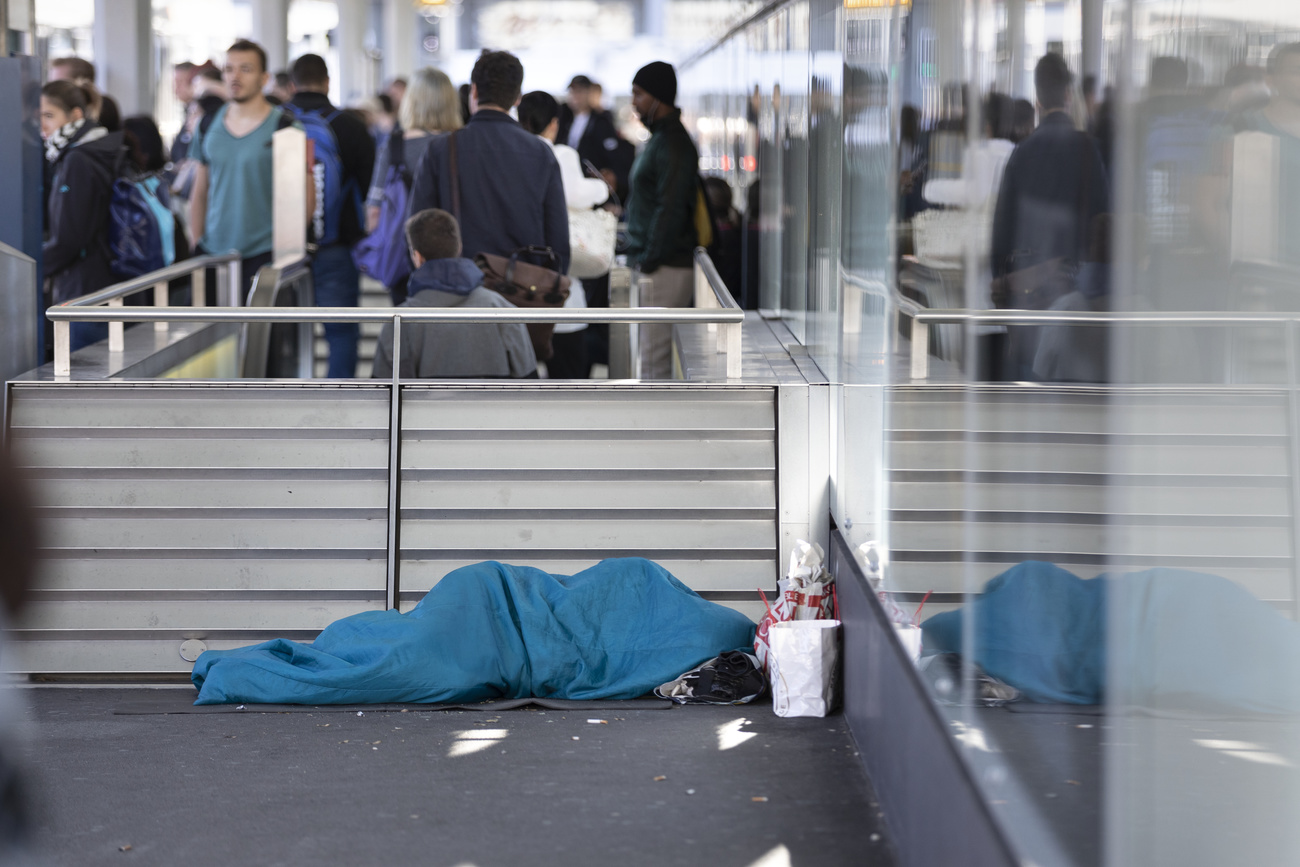
Homelessness needs to be tackled with a sense of urgency

In various Swiss cities, the provision of emergency sleeping facilities for the homeless are not enough.
If you stroll through Bern’s city centre in the evening, it is not uncommon to come across homeless people. They spend the night wrapped in sleeping bags in the arcades or on a park bench.
Silvio Flückiger has been working for Pinto for years. The organisation carries out social work in public spaces in Bern. He has never experienced such a situation as in the last few months.
“In contrast to the past, the number of homeless people has about doubled,” he says.
Emergency sleeping facilities at the limit
The Salvation Army’s shelter in Bern also reports many people seeking help. Lately, the shelter has practically always been full – even though additional places were set up two years ago.
The situation is similar in the city of Biel where the emergency shelter has been full in recent months.
Similar reports can be heard from the cities of Basel and Geneva. A study published last year also concluded that Bern has more homeless people than other cities in German-speaking Switzerland.
The city has various facilities where homeless people can spend the night in an emergency. Pinto also offers a drop-in centre on the edge of downtown Bern. Twice a day, anyone without a place to stay can report here; there are lockers, a washing machine and a shower.
“The development of the last few months shows that doing something is not only necessary, but urgent,” says Flückiger.
The pressure on those affected by poverty is increasing, says social researcher Jörg Dittman from the University of Applied Sciences of Northwestern Switzerland.
“The costs of daily living are rising, the housing market has been under pressure for years,” he says.”
Thirty-seven-year-old David drops by Pinto for the first time. He used to live and work in a social institution but was dismissed without notice.
“I got into trouble with various people there. My alcohol addiction was also an issue again and again,” he says.
Now he has no flat, no job, hardly any friends.
“I now have to see where I want to spend the next few days. I don’t want to be a burden to anyone.”
Number of foreign homeless on the rise
More and more foreigners are among the homeless. They want to try their luck here – and get stranded. Their numbers are likely to increase, sociologist Dittmann suspects.
“Wars and great poverty in other countries are drivers of homelessness – also in Switzerland.”
A study published last year came to the conclusion that almost two thirds of the homeless are undocumented migrants with no legal right to be in Switzerland.
Thinking about next winter
In Bern, the authorities want to prepare for the next winter.
“In Bern we want to make a place to sleep possible for everyone who wants it,” says Franziska Teuscher, the social director in charge.
The project “Housing First” helps homeless people get an apartment. This provides the basis to return to a regular life more quickly. Basel was the first Swiss city to launch such a project in 2020.
Journalist Marlène Sandrin from the public broadcaster SRF assesses the situation.
SRF News: What exactly is “Housing First”?
Marlène Sandrin: The difference to other offers is big. It is a new approach. People seeking help are given a place to live. It’s about people who otherwise have no chance and have been turned down by other institutions. They sign the housing contract themselves. It is assumed that this is the first step back to a normal life.
What has the experience been like?
The trial runs for three years. It is not easy. The most difficult thing – and this was expected – is finding suitable flats. Because free flats are rare just under 20 flats could be found, which is not very many.
Those responsible and those directly affected say, however, that for many this step, moving into their own flat, is a great relief. But it is also clear that this is not the end of the story. Those affected need additional care.
Will the trial continue?
The project has been extended until the end of the year. However, “Housing First” will continue to exist as part of the housing strategy of the canton of Basel City
The topic has been on the political agenda for some time. Recently, Bern’s city parliament called for additional places in emergency shelters, especially for women. The search for a suitable property is underway, Teuscher confirms.
In addition, new counselling services in the area of housing are to be introduced in the next few months. In the future, the city also wants to take care of the rental deposit for people affected by poverty who have a chance of finding a place to live.

In compliance with the JTI standards
More: SWI swissinfo.ch certified by the Journalism Trust Initiative
































You can find an overview of ongoing debates with our journalists here . Please join us!
If you want to start a conversation about a topic raised in this article or want to report factual errors, email us at english@swissinfo.ch.